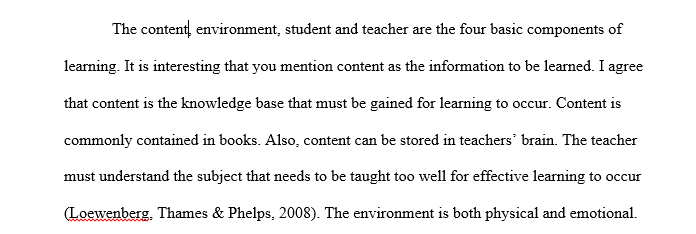Components of learning
Components of learning
How do you define learning in a psychological context? Your readings lists four components which define learning. Describe the four components of learning and provide a real-life example of learning incorporating all four components.
Forum post #1
According to the text the four components of learning are content, environment, student and teacher. The content is simply the information and/or materials that is to be learned. The environment which plays a very big part in whether or not the individual is or will learn the content. The environment often times may need to be tailored to an individual’s needs. I.e. noisy or very quiet, one on one or multiple people. The student(s) is the individual who will be studying the content and learning in the environment. The student have the ability to set the stage to what they will learn, by their expectation and mindset to learn. The teacher would be considered the person who will be teaching the content to the student in the said environment. The teacher method of teaching should possess particular skills to help the student learn. Learning can take on ma y shapes and could be done in many different however each concept involves some type of stimuli. For example: Getting an online degree. As an online environment, it offers flexibility for those who live a busy lifestyle, without the hassle of attending a typical classroom, yet still offering the contents to learn and achieve higher education. However, I as the student must possess a positive mindset in order to be completely successful. If my attitude about this class going in is that: I will pass the class no matter how hard the tasks; more than likely I will have a positive attitude throughout which often sets the stage for how well I will learn. The teacher in this particular example will be responsible for providing/communicating the materials/skills and possess the qualities and attributes to help his or her students to learn the materials/content.
Forum post #2
Learning is usually classified as a change in behavior that occurs because of an experience (Spielman, 2018). According to the textbook provided by OpenStax, there are four basic types of learning. These are Associative Learning, Spatial Learning, Cognition, and Problem Solving (Spielman, 2018). Associative Learning is generally anything that would be learned from the interaction with the environment, including things that would normally be classified under behaviorism like Classic and Operant Conditioning. The difference between Classic and Operant Conditioning is usually defined by whether the process is naturalistic or intentional. These kinds of learning typically require positive or negative reinforcement for learning to result in long-term changes in the subject (Spielman, 2018). The second kind of learning is Spatial Learning, which as the name implies, is anything that is learned through observing another and modelling that behavior. Once common example that was seen this week is imprinting. The third learning type would usually be classified as Cognition, which is divided into categories known as concepts, which is an abstract term that might represent an image, and idea, or an experience (Spielman, 2018). Cognition often works in conjunction with spatial learning, because a subject will observe something, and then classify it based on his or her knowledge and experiences. This can be based on objects in the natural world, or things presented in media (Spielman, 2018). The final type of learning discussed in the OpenStax material on Learning is Problem Solving, which is usually classified as things that a subject will teach themselves through the process of trial and error (Spielman, 2018).
Forum post #3
Learning in a psychological context can be defined as the revision of knowledge or behavior due to gained experience. The more you experience, the more you will learn! It was actually quite challenging for me to find “the four components of learning” in the text. I discovered different types of learning – associative learning, observational learning, cognition and latent learning – but the forum asks for the components of learning, which are parts or elements of learning. Based off of the reading, components of learning that I found include: association, experience, sequence, and change. Association occurs when our brains take different factors or events, consciously or unconsciously, and join these factors or events together. When completed in a sequence, we are better able to comprehend the new information. We gain experience when we undergo new events. The experience might not be important if we do not open our minds to the possibility of change. We might not permanently change our behavior due to an experience, but the experience might have made even the smallest impact where we temporarily change our behavior. An example might be a newly deployed military member experiencing his or her first incoming projectile notification. (When an attack to the base is imminent and everyone needs to seek shelter and take cover) There is a predictable sequence each time. An alarm sounds, a loud voice is heard overhead, everyone takes cover until the “all clear”, and then activities are resumed. In the beginning, the newly deployed military member might not understand the process, so he or she will look to others during the event to understand what to do. With each gained experience, the military member’s knowledge increases, prompting the process of learning.
Solution preview for the order on Components of learning
APA
893 words
